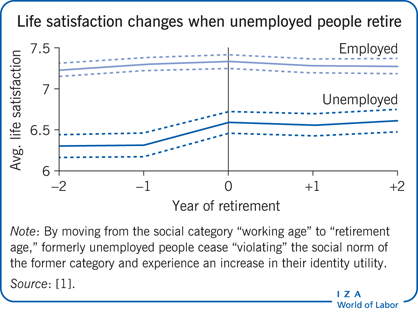Elevator pitch
Unemployment not only causes material hardship but can also affect an individual’s sense of identity (i.e. their perception of belonging to a specific social group) and, consequently, feelings of personal happiness and subjective well-being. Labor market policies designed to help the unemployed may not overcome their misery: wage subsidies can be stigmatizing, workfare may not provide the intended incentives, and flexicurity (a system that combines a flexible labor market with active policy measures), may increase uncertainty. Policies aimed at bringing people back to work should thus take the subjective well-being of the affected persons more into consideration.
Key findings
Pros
Income matters, but it is not only material hardship that causes distress for the unemployed.
Unemployment threatens a person’s sense of social identity and self-worth, but barely reduces emotional well-being derived from day-to-day experiences.
Workfare initiatives can effectively separate the voluntarily from the involuntarily unemployed without harming those who take them up.
A flexicurity system that helps people back to work significantly increases subjective well-being, as it allows people who re-enter the labor market to restore their identity.
Cons
Active labor market policy instruments, such as wage subsidies, could diminish subjective well-being, e.g. through the stigma associated with receiving welfare transfers.
Workfare participants may consider workfare initiatives as less detrimental than being unemployed; workfare may thus not provide the intended incentives to look more intensively for a new job.
Although flexicurity may improve subjective well-being, it comes at the cost of higher job insecurity, which is not completely offset by higher employability.
